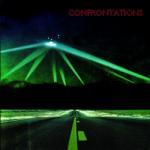
Umberto Confrontations
(Not Not Fun)
In many ways, instrumental records have greater scope for creativity without the necessity of lyrics clambering for attention. Rather, the focus can be the subtleties of composition. Often, these records require more space to express themselves and it’s as if once the vocal is removed, other communicative instincts begin to elevate themselves. One thing is for sure, the instrumental record must do more than an ordinary, or ‘pop’, record.
More in the sense that the message must be more explicitly conveyed in the sound, the atmosphere must fuel emotional content and collaborate towards a ‘whole’ ideal. The record has to produce undertones which intrigue; and Confrontations often obliges, providing an electronic mist that condenses on our skin. The lack of direct human expression always provides the issue of how this relates, recalling elements of last year’s Zeros by The Soft Moon.
There is, of course, always a human presence in the curation of a sound, but can that amount to an expressive record? Confrontations has been likened to a sci-fi film score, perhaps because of the angular and magnetic synths evident throughout. If that likeness were to be indulged, space becomes a limited entity and an attempt to convey such an infinite expanse can only sound insignificant. But that’s not necessarily how Hill imagined it himself.
The album title suggests a plethora of possibilities in its vagueness. But there is a tension, a conflict – a confrontation – that immerses the listener. The regimented guttural rhythms puncture through smothering clouds of synth, amalgamating a sharp, skeletal frame with soft, azure grooves. Their intelligibility becomes futile as the ferocity builds towards impending nirvana, or purgatorial hell. This could represent a confrontation between life vicariously expressed through electronic instrumentation and its demise as a consequence.
Can art, or life, exist through the interpretation of technology? The question seems obviously proposed with the unease both in form, which convolutes and morphs, and in the sounds themselves which seem purposely limited. They reform and regenerate but are essentially recycled, exploring the multifarious possibilities in combination – binary music.
Whether Confrontations is simply a sci-fi score depends, of course, upon the perspective of the listener, but it seems a little shallow to define it so simply. Hill has created a sound which is a collective ‘whole’, punctuated by single beats and admittedly futuristic notes. His control of composition is highly skilled and ambitious with much hidden beneath the obvious cyclic samples of icicles falling with xylophonic zings.
But here is a confrontation that is submerged within, and it occurs because of this record. The soul of the record, which is being expressed, is entirely human, but the limbs and voice are entirely prosthetic. There’s uncertainty whether the controlled experiment of Confrontations resonates, not sonically, but emotionally. It proposes questions and begins a dialogue, but can it make us feel; or is it a cold sci-fi voyage into the infinite unknown?
